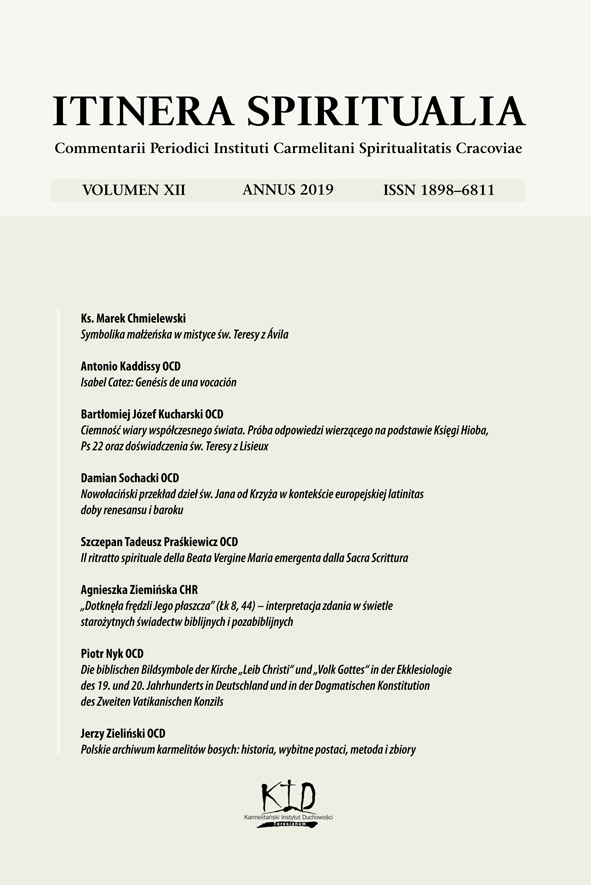Il Ritratto spirituale della Beata Vergine Maria emergenta dalla Sacra Scrittura
DOI:
https://doi.org/10.12775/IS.2019.005Słowa kluczowe
Maryja, Córa Synjonu, ubodzy anawim Jahwe, życie duchowe, Pismo ŚwięteAbstrakt
The article examines the issue of Marian spirituality in the light of biblical revelation. It reminds us that although the original proclamation of the apostles, i.e. the kerygma contained in the Acts of the Apostles, focuses on the key event of the salvation of Jesus’ death and resurrection, without any direct mention of his Mother, the Apostle Paul mentions the Mother of the Messiah (Gal 4:4), and the evangelists not only place her in God’s salvific plan, but also show her virgin motherhood through the action of the Holy Spirit (Matt 1:18–25), and using different ways shape her spirituality. The Virgin of Nazareth, as a pilgrim in faith (Lk 1:45), a model of prayer (Lk 1:46; Acts 1:14) and a model of meditations on the word of God (Lk 2:19.51), is worthy of praise according to her own prophetic words, “From now on all generations will call me blessed” (Lk 1:48). The people of God, following Elizabeth (Lk 1:42), should proclaim Mary blessed because God, through his Angel (Lk 1:28), called her “full of grace” and chose her from all women as the mother of his son. Moreover, Christ’s followers should take Mary as the beloved disciple did (Jn 19:27) and should keep her “spiritual will” from Cana of Galilee: “do whatever he tells you” (Jn 2:5), which harmonizes with the words of God the Father in the theophany on Mount Tabor “Listen to him!” (Matt 17:5). The Bible shows Mary having with a unique task to fulfil in the history of salvation, which Christians must recognize by accepting her, opening themselves to her glory and accepting her motherly and exemplary attitude, always keeping in mind the full picture of the biblical message.Bibliografia
CHMIELEWSKI M., Maryjny wymiar duchowości katolickiej. Wybór czy konieczność, “Salvatoris Mater” 12 (2010), n. 1–2, p. 11–23.
DA SPINETOLI O., Maria nella Bibbia, Bologna 1988.
DE FIORES S., Maria nella vita spirituale, Roma 1995.
DE LA POTERIE I., Maria nel Nuovo Testameto, in: Nuovo Dizionario di Teologia Biblica, ed. P. Rossano, G. Ravasi, A. Girlanda, Milano 1988.
GOFFI T., Spiritualità mariana, in: Nuovo Dizionario di Mariologia, ed. S. De Fiores, S. Meo, Roma 1988, p. 1362–1378.
HINES M.E., Maria, in: Nuovo Dizionario di Spiritualità, ed. M. Downey – L. Borriello, Vaticano 2003, p. 411–421.
KUDASIEWICZ J., Oto Matka twoja. Biblijny katechizm maryjny, Kielce 2007.
NAPIÓRKOWSKI S.C., Matka naszego Pana, Tarnów 1992.
NAPIÓRKOWSKI S.C. – PEK K., Przez Jezusa do Maryi. Materiały z sympozjum mariologicznego, Częstochowa–Licheń 2002.
PRAŚKIEWICZ SZ.T., Duchowość maryjna, Kraków 2008.
PRAŚKIEWICZ SZ.T., La B.V.M. nella vita spirituale, Roma 1997.
RAVASI G., I volti di Maria nella Bibbia, Roma 2007.
RYBICKI A., Maryjna duchowość, in: Leksykon duchowości katolickiej, ed. M. Chmielewski,
Lublin–Kraków 2002, p. 493–496.
Pobrania
Opublikowane
Jak cytować
Numer
Dział
Licencja
1. W myśl regulacji prawnych zawartych w ustawie o prawie autorskim i prawach pokrewnych z dnia 4 lutego 1994 r., autor przekazuje autorskie prawa majątkowe dotyczące składanego dzieła wydawcy czasopisma "Itinera Spiritualia". Przeniesienie praw autorskich do składanego dzieła następuje na wszystkich polach eksploatacji, w szczególności tych wymienionych w art. 50 ustawy o prawie autorskim i prawach pokrewnych: 1. W zakresie utrwalania i zwielokrotniania utworu – wytwarzanie określoną techniką egzemplarzy dzieła, w tym techniką drukarską, reprograficzną, zapisu magnetycznego oraz techniką cyfrową. 2. W zakresie obrotu oryginałem albo egzemplarzami , na których dzieło utrwalono – wprowadzanie do obrotu, użyczenie lub najem oryginału albo egzemplarzy. 3. W zakresie rozpowszechniania utworu w sposób inny niż określony w pkt. 2 – publiczne wykonanie, wystawienie, wyświetlenie, odtworzenie oraz nadawanie i reemitowanie, a także publiczne udostępnianie utworu, aby każdy mógł mieć do niego dostęp w miejscu i czasie przez siebie wybranym.
2. Za zgodą Redakcji czasopisma artykuły i recenzje opublikowane w roczniku "Itinera Spiritualia" mogą być przedrukowywane w innych publikacjach.
3. Autor, w celach niekomercyjnych, może w dowolny sposób, bez zgody Redakcji, rozpowszechniać swój tekst w wersji elektronicznej.
4. Redakcja publikuje teksty on-line na licencji Creative Commons Uznanie autorstwa-Bez utworów zależnych 3.0 PL.
Statystyki
Liczba wyświetleń i pobrań: 751
Liczba cytowań: 0



